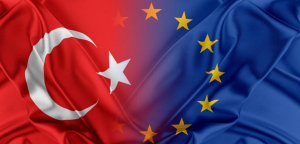The Committee of Foreign Affairs (AFET) contributes to the formation of the Union’s foreign policy via democratic and peaceful procedures with the purpose to keep strong ties with the third countries as it is possible.
Going back to the history, it is obvious that many efforts have become by European Union in order to “europeanise” Turkey, which means that many negotiations and agreements had had as a main principle to align the interest of Turkey with those of European Union. Explicitly, this alignment usually finds a hindrance due to the turbulent relations between Turkey and Greece about the violation of the aircraft area and the Cypriot Issue.
Nevertheless, the most important hindrance in the Turkey’s access in European Union is the criteria which have to be fulfilled by Turkey. The criteria that must be met by European countries are known as Copenhagen Criteria, the guarantee of democracy’s stability, the functioning market economy and the legislative. The most vital of them is the stable existence of democracy which is absent from Turkey’s institutions. The stability of democracy, the protection and the preservation of human rights and minorities and the rule of law are undeniably the main principles of European integration which must be kept absolutely by a member state or by a state which is going to enter this union.
As it is apparent, Turkey, after the coup d’état on 15 July of 2016 and the constitutional referendum which took place on 16 April of 2017 and transformed Turkey’s political system into a presidential one, is not a good keeper of European Union’s high principles-criteria concerning the authoritarianism of the President Recep Tayyip Erdoğan and the violence following the coup d’état against humans.
To conclude, beyond those obstacles in political level, European Union should not interrupt its relations with Turkey with a view to finding a bridge between two countries’ interests. Not closing their eyes to Erdoğan ’ s authoritarianism, the Members of the Committee would have to face this challenging issue and end up to a solution that would be defined by democratic values and hopeful for both of parts’ future.
By Marianthi Pelekanaki.

